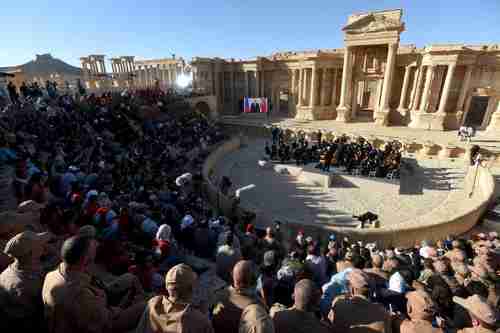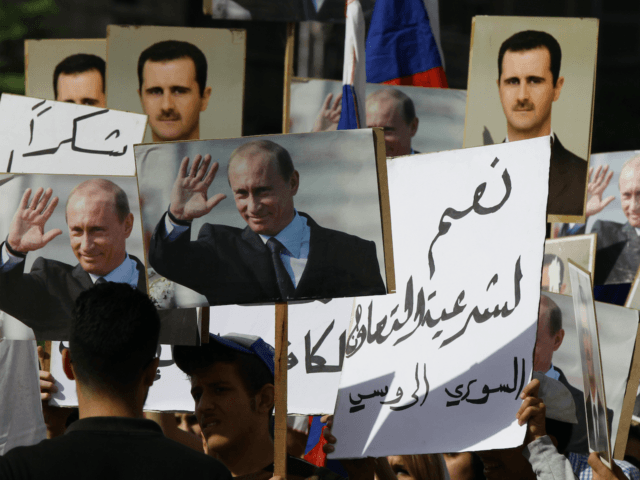This morning’s key headlines from GenerationalDynamics.com
- Syria’s Bashar al-Assad calls Aleppo’s ‘liberation’ a historic event
- Syria and Russia suffer a big military setback in Palmyra
- Syria’s civil war shows similarities to America’s Vietnam war
Syria’s Bashar al-Assad calls Aleppo’s ‘liberation’ a historic event

Russia holds a concert on 5-May to celebrate the recapture of Palmyra from ISIS. Note that Vladimir Putin is on the wide-screen tv on the left side of the stage (AFP)
A year ago, al-Assad himself said that his army was close to being defeated. Since then, three more armies — from Russia, Iran and Lebanon’s Hezbollah – have rushed to his aid, and al-Assad is claiming a “history in the making” victory:
[The liberation of Aleppo was] history in the making and worthy of more than the word congratulations.
History is being written in these moments. Every Syrian citizen is taking part in the writing. It started not today, but years ago when the crisis and the war on Syria began.”
I think that after the liberation of Aleppo we’ll talk about the situation as … before the liberation of Aleppo and after the liberation of Aleppo.
An analyst, Alexander Khrolenko, quoted by Russian state media agrees. He says that the city’s liberation has had a ripple effect across the country. The victory has weakened radical groups located in the province of Idlib:
Until recently, the militants controlled key oil fields and communications channels with Turkey in the Euphrates valley. Aleppo’s liberation has undermined the economic base of terrorist groups and the supply routes to Raqqa, the capital of Daesh’s caliphate. Now the Syrian Arab Army could focus on two regions, Idlib and Raqqa.
In the title of this article I referred to “the light at the end of the tunnel,” because that phrase was used by Presidents Lyndon Johnson and Richard Nixon in making claims about victory in the Vietnam War that sound very similar to those of al-Assad and Khrolenko. Al Masdar News (Damascus) and International Business Times and Sputnik News (Moscow)
Related Articles
- UN Syria envoy Staffan de Mistura predicts total destruction of Aleppo by Christmas (07-Oct-2016)
- Syria’s al-Assad goes for the kill, turning Aleppo and civilians to bloody rubble (24-Sep-2016)
- Syria and Russia continue ‘Grozny Model,’ killing women and children in Aleppo refugee camp (06-May-2016)
Syria and Russia suffer a big military setback in Palmyra
If it takes four armies to capture one city, Aleppo, in a period of many months, it is delusional to believe that the rest of the country is going to fall quickly.
Al-Assad and Russia’s president Vladimir Putin received a taste of what they are in for this week when the so-called Islamic State (IS or ISIS or ISIL or Daesh) recaptured the city of Palmyra from Syrian and Russian forces last weekend. Not only that, but ISIS entered the big Russian-Syrian T-4 air base outside the town, carrying off substantial quantities of Russian armaments including assault rifles, ground-to-ground missiles, anti-tank missiles, and anti-air rockets.
Russia’s troops, backed by massive airstrikes, had captured Palmyra in March of this year. Putin had declared the recapture a major victory in the war and a major turning point (which is what he’s saying now about Aleppo).
Putin even held a triumphal, widely televised concert in Palmyra’s Roman ruins on May 5, with the orchestra conducted by the internationally distinguished maestro Valery Gergiev. So ISIS’s success in Palmyra is a major fiasco for Russia and a major humiliation.
According to reports, the way it happened is that Palmyra was originally recaptured from ISIS by Russia’s special forces (Spetsnaz). Afterwards, the special forces were withdrawn from Palmyra and sent to Aleppo, where they are involved in the war there. According to Igor Konashenkov of the Russian defence ministry, ISIS immediately sent about 5,000 jihadists from Raqqa to Palmyra to achieve its victory.
Undoubtedly, once Aleppo is captured, Syria and Russia will turn back to Palmyra and recapture it again from ISIS. But will that leave Aleppo vulnerable? And if it took four armies to capture Aleppo, while losing Palmyra, how can they hope to recapture the entire regions of Syria that are under control of the Free Syrian army, al-Nusra, and ISIS, and keep captured areas under control?
When American forces scored victories in the Vietnam war, presidents Johnson and Nixon talked about the “light at the end of tunnel,” but the North Vietnamese forces did not stop fighting, which is what al-Assad and Putin expect ISIS to do after the capture of Aleppo. Guardian (London) and Debka
Related Articles
Syria’s civil war shows similarities to America’s Vietnam war
In 1953, French forces under the command of Gen. Henri Navarre were fighting Ho Chi Minh’s communist forces in Vietnam. Navarre said, “Now we can see [success in Vietnam] clearly, like light at the end of a tunnel.” The French forces were decisively defeated at Dien Bien Phu in May 1954.
In June 1966 President Lyndon Johnson said “I urge you to remember that Americans often grow impatient when they cannot see light at the end of the tunnel – when policies do not overnight usher in a new order. But politics is not magic. And when some of our fellow citizens despair of the tedium and time necessary to bring change – as, for example, in Vietnam today – they are forgetting our own history.”
The phrase “light at the end of the tunnel” was repeated frequently in the 1960s in reference to the Vietnam war, both by government officials and by antiwar activists mocking government officials. The Tet Offensive in 1968 turned public opinion negative towards the war, though it did not end until several years later.
This week, Bashar al-Assad and Vladimir Putin are talking about a “history in the making” victory. It’s not exactly the same phrase as “light at the end of the tunnel,” but it has the same flavor.
Let’s make three comparisons between America in the 1960s and Syria today:
- America was in a generational Awakening era. America’s previous generational crisis war was World War II, which had ended explosively with the firebombing of Dresden and the nuking of Japan. These acts were so shocking that they ended the war shortly after.
- America tried to repeat its WWII strategy by bombing strategic targets in North Vietnam, but with little success. The rules of war are different in generational Awakening eras than they are in Crisis eras. Survivors with memories of the last crisis war are not so easily shocked.
- In fact, America was hampered by its own lack of will to fight, something that almost all historians agree with today. Whereas America could use a nuclear weapon to end WW II, domestic and international political pressure forced America to use bombs carefully and sparingly, to prevent civilian casualties, and to take various humanitarian breaks, especially at Christmas.
Now let’s look at what’s happening in Syria today:
- Syria is in a generational Awakening era. Syria’s previous generational crisis war was the Syrian civil war that climaxed in February 1982 with the destruction, by Bashar’s father Hafez al-Assad, of the town of Hama. There had been a massive uprising of the 400,000 mostly Sunni citizens of Hama against Syria’s president Hafez al-Assad. He turned the town to rubble and killing or displacing hundreds of thousands. Hama stands as a defining moment in the Middle East. It is regarded as perhaps the single deadliest act by any Arab government against its own people in the modern Middle East. It was a shocking act that ended the war.
- Al-Assad is trying to repeat his father’s 1982 success by repeating in Aleppo the same acts that his father committed in Hama. But the rules of war are different in generational Awakening eras than they are in Crisis eras. Nobody is shocked by what al-Assad is doing, only sickened and disgusted.
- In fact, Syria and Russia are hampered by enormous international pressure to protect civilians and provide humanitarian aid. Just as America could have won the Vietnam war by dropping a nuclear bomb on Hanoi, al-Assad and Putin could probably win the war in Syria by dropping nuclear weapons on Aleppo, Idlib and Raqqa, but they’re being held back by international pressure to prevent civilian casualties and to provide humanitarian aid.
Presidents John Kennedy, Lyndon Johnson and Richard Nixon were all delusional about the war in Vietnam. Bashar al-Assad and Vladimir Putin are even more delusional about the war in Syria. The Syrian civil war will be an even worse disaster than the Vietnam war. History.com and Global Security
Related Articles
- Russia warns that Syria war could become a ‘proxy war’ (01-Nov-2015)
- Generational History of Vietnam (18-May-2014)
KEYS: Generational Dynamics, Syria, Bashar al-Assad, Aleppo, Palmyra, Russia, Vladimir Putin, Alexander Khrolenko, Igor Konashenkov, Islamic State / of Iraq and Syria/Sham/the Levant, IS, ISIS, ISIL, Daesh, Vietnam, Gen. Henri Navarre, Ho Chi Minh, Dien Bien Phu, Tet Offensive, Hama, Idlib, Raqqa
Permanent web link to this article
Receive daily World View columns by e-mail

COMMENTS
Please let us know if you're having issues with commenting.